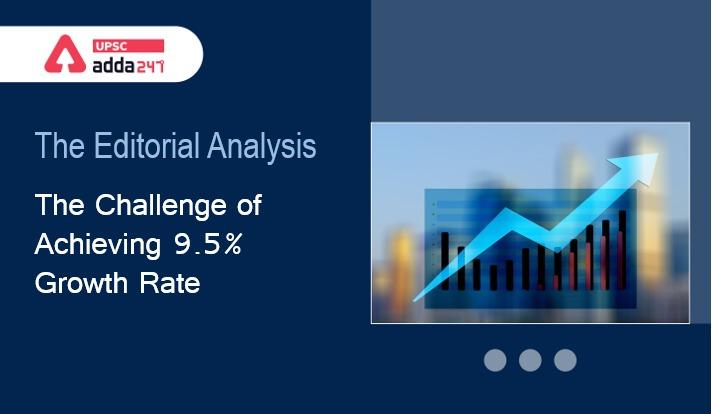Table of Contents
The challenge of achieving 9.5% growth rate: Relevance
- GS 3: Indian Economy and issues relating to planning, mobilization, of resources, growth, development and employment.
The challenge of achieving 9.5% growth rate: Context
- Recently, National Statistical Office (NSO) has released the second quarter gross value added (GVA) and gross domestic product (GDP) numbers, which indicated the pace of economic recovery in India after the two COVID-19 waves.
- The growth of first and second quarters are largely driven by the strong base effect. As the base effect weakens in the third and fourth quarters of 2021-22, a strong growth momentum would be needed to ensure that at the end of this fiscal year, GVA and GDP in real terms exceed their corresponding pre-COVID-19 levels of 2019-20.
The challenge of achieving 9.5% growth rate: Key points
Improved sectors
- In the first half of 2021-22, four of the eight GVA sectors have exceeded their corresponding 2019-20 levels. These are agriculture; electricity, gas; mining and quarrying; and public administration, defence and other services.
- Growth in these sectors is majorly due to Central government’s emphasis on capital expenditure which started gathering momentum in recent months.
- Emphasis of Government on expenditure, supplemented by private investment resulted in gross fixed capital formation (GFCF) showing a positive growth of 1.5% in the second quarter of 2021-22 over its corresponding level in 2019-20.
- However, to ensure a positive growth at the end of this fiscal year, investment as well as consumption demand have to pick up strongly in the remaining two quarters.
Growth projections
- Both the Reserve Bank of India (RBI) and the International Monetary Fund (IMF) have projected annual growth at 9.5% for 2021-22.
- To achieve this target, we require a growth of 6.2% in the second half of 2021-22.
- Moreover, if we achieve the growth rate 9.5% in 2021-22, we can be confident that 2022-23 will see a growth rate of 6% to 7%.
Economic recovery: government capital expenditure
- Government capital expenditure forms the core of measures needed to achieve the requisite GDP-targets.
- Moreover, the Centre’s gross tax revenues have shown an unprecedented growth rate of 64.2%, which could facilitate the government expenditure.
- However, the increase in fiscal expenditure might bring pressure to fiscal deficit target of 6.8% because of upward revisions in some expenditure items such as food and fertilizer subsidies, MGNREGA and extension of the Pradhan Mantri Garib Kalyan Anna Yojana.
- In spite of these pressures, it would be advisable for the Centre to continue infrastructure spending.
- The Centre’s incentivisation of state capital expenditure through additional borrowing limits would also help in this regard.
- The gross tax revenues of Centre in 2021-22 as compared to 2019-20 would also supplement the Government emphasis on increased expenditure.
High frequency indicators
- PMI (Purchasing Managers Index) manufacturing increased to a 10-month in October 2021.
- PMI services remained high at 58.1 in November 2021, its second-highest level since July 2011.
- Gross GST collections at ₹1.31 lakh crore remained above the benchmark of ₹1 lakh crore for the fifth consecutive month in November 2021.
- Core IIP growth increased to 7.5% in October 2021 from 4.4% in September 2021.
- Merchandise exports growth was at 26.5% in November 2021 and 43.0% in October 2021 as compared to the corresponding month of the previous year.
Also Read:





 TSPSC Group 1 Question Paper 2024, Downl...
TSPSC Group 1 Question Paper 2024, Downl...
 TSPSC Group 1 Answer key 2024 Out, Downl...
TSPSC Group 1 Answer key 2024 Out, Downl...
 UPSC Prelims 2024 Question Paper, Downlo...
UPSC Prelims 2024 Question Paper, Downlo...




